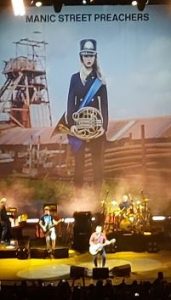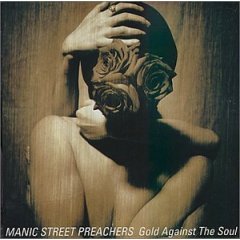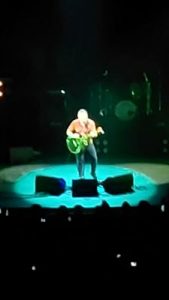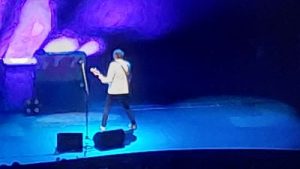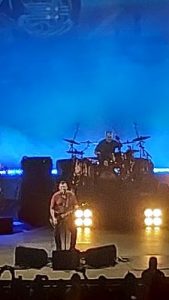
© Chrysalis
My previous blog-post was about seeing Deep Purple live in concert. This was the most recent of many gigs I’ve been to. Indeed, by my calculations, I’ve seen about 160 musical acts perform live, starting with veteran Scottish hard rock / heavy metal group Nazareth, whom I saw in Aberdeen in 1984.
Anyway, this has got me thinking about the best gigs I’ve ever been to. Here are my favourite eight.
The Proclaimers – Aberdeen Ritzy, 1987
I didn’t know what to expect when some mates got me along to a concert by Craig and Charlie Reid, better known as Scottish folk-pop duo the Proclaimers. I liked the Reids – their hit song that year, the politically charged Letter from America, was already becoming Scotland’s great anti-Maggie-Thatcher anthem – but I had no idea what they’d be like live. Also, they were performing at Aberdeen Ritzy, a place I had an aversion to because I’d once worked there as a member of the floor-staff and it was the least enjoyable job I’d ever had.
I had no reason to be apprehensive. The gig felt like a giant, joyous football match where the entire crowd supported the same team and that team was winning 10-0. I suspect one reason why the Proclaimers went down so well that night was because the Aberdonian audience could relate to their song Throw the R Away, which is about the frustrations caused when standard English-speakers can’t understand your accent. Which is a common hazard if you speak Aberdonian.
The Jesus and Mary Chain, Dinosaur Jr, My Bloody Valentine, Blur – the Rollercoaster Tour, London Brixton Academy, 1992
From Craig and Charlie Reid to two more Scottish siblings called Reid. These were Jim and William Reid of the feedback-drenched East Kilbride noise-niks the Jesus and Mary Chain. Their Rollercoaster Tour date at Brixton Academy in 1992 offered not only excellent support from American alternative rockers Dinosaur Jr and dreamy, swirly shoegazers My Bloody Valentine, but also a chance to sample a young, up-and-coming band called Blur. Though my reaction when I saw Damon Albarn onstage wasn’t that he was destined to be an icon of the future Britpop movement but that he resembled a very young, musical version of Norman Wisdom.

© Blanco y Negro
Meanwhile, the headliners blew me away. Promoting their recent album Honey’s Dead (1992), which was packed with behemoth tunes like Reverence and Sugar Ray, the Jesus and Mary Chain performed in silhouette against a giant blood-red backdrop. This made them look like the imperious Masters of the Universe.
The Manic Street Preachers – Sapporo Penny Lane, 1993
Welsh rock band the Manic Street Preachers were promoting their album Gold Against the Soul when they turned up in the Japanese city of Sapporo, at whose Hokkai-Gakuen University I worked at the time as a lecturer. Though in Britain they were seen as having a punk edge, the Japanese took their fondness for glam clothes and eyeliner as meaning they were another Guns n’ Roses. Thus, their gig at Sapporo’s Penny Lane drew a lot of Japanese girls wearing silk scarves and floppy hats, who kept squealing “Rich-ee!” at the Manics’ guitarist, Richey Edwards. The gig was both excellent and dramatic – the drama coming when the highly-strung Edwards freaked out about an illuminated fire-exit sign at the other end of the auditorium that he claimed was putting him off his performance.
Since then, that gig has haunted me in two ways. Firstly, around the same time, I bought the Japanese edition of Gold Against the Soul. Years later, long after Edwards’ tragic and never-explained disappearance in 1995, I listened to it again and discovered the CD case contained a second tray that I hadn’t noticed before. In it was a bonus CD, a live one of them performing in Japan. When I played it, I felt poignantly transported back in time – for there, in the crowd, were those Japanese girls shouting “Rich-ee!” again at poor, doomed Richey Edwards.

From wikipedia.org / © Masao Nakagami
Secondly, when I saw the Manic Street Preachers again last year, in Singapore, they played a new song called Still Snowing in Sapporo, which I learned was inspired by that long-ago gig in 1993. How weird, I thought, to be in the audience listening to them playing a song about a concert 30 years earlier… knowing I was were probably the only person in the audience who was at that concert.
The Beastie Boys – Sapporo Jasmac Plaza, 1995
I almost didn’t attend this gig, which also took place while I worked at Sapporo’s Hokkai-Gakuen University. The show was due to begin at 7.00 PM – concerts in Japan tended to start when the tickets said they would – and the same evening I had to give a late lecture until 7.20 PM. Plus I calculated that by the time I got from the university campus to the venue, the Jasmac Plaza, the Beastie Boys would already be an hour into their gig. It didn’t seem worth it.
However, a few weeks before the concert, it was announced that work had been completed on a new Sapporo subway line, which had a station called Gakuen-Mae directly below the campus where I was working. I also discovered that the next station along the new line, Hosui-Suskino, had an exit that was only a block from the Jasmac Plaza. And a subway train left for Hosui-Susukino from Gakuen-Mae every evening at 7.30. I figured that if I caught the 7.30 train, and moved very fast, I could be at the concert hall in the Jasmac Plaza ten minutes later – hopefully not yet halfway through the Beastie Boys’ set. Fate seemed to be urging me to buy a ticket, so I did.
That evening, I finished my lecture on the stroke of 7.20, ran like hell for the subway station and charged down what seemed like half-a-dozen escalators, descending deeper and deeper into the earth. The train was already at the platform and I ran and jumped through its about-to-close carriage doors. At Hosui-Susukino, I sprang out of the train, ran up more escalators, ran along a city block into the Jasmac Plaza and up several staircases to its fourth floor, where the concert hall was. Live music blasted out of speakers above me. I dashed into the hall, gasping for breath, my university lecturer’s suit, shirt and tie soaked in sweat… And I discovered that the Beastie Boys weren’t on stage at all. What I was hearing was a support act that hadn’t been mentioned on the bloody ticket. The Beasties didn’t appear until forty minutes later.
After that, it needed to be a superb gig to justify all the hassle and indignity I’d suffered. Which, thankfully, it was.

© Mute
Nick Cave – Edinburgh Princes Street Gardens, 1999
During the 1999 Edinburgh Festival, goth-rock troubadour Nick Cave – without his band the Bad Seeds – performed in Edinburgh’s Princess Street Gardens, which meant he had the craggy Edinburgh Castle rock, crowned by the battlements of the castle itself, as a spectacular backdrop. But there was a problem. Taking place in the castle was the Edinburgh Tattoo, that celebration of tartan-swathed, bagpipe-wailing Scottish military kitsch held every August; and the Tattoo organisers were not happy about having to compete against a concert below in the Gardens. Indeed, a few evenings earlier, the Gardens had hosted the psychedelic / space-rock outfit Spiritualised and their percussive beats had caused the Lone Piper – the bagpiper who appears on the ramparts at the Tattoo’s finale to play the lament Sleep Dearie Sleep – to lose concentration and mess up the tune. This evening, to placate the Tattoo, Cave wasn’t allowed to start playing until it had finished, meaning the audience turned up at the time specified on the tickets but then had to wait an hour. To keep us entertained, some local performance-poets were brought onstage, including the late, lamented Paul Reekie.
One consequence of this was that when Cave finally did come on, the end-of-Tattoo firework display was erupting above the castle. Talk about a spectacular entrance. And the ensuing gig was worth the long wait. The songs, mostly stripped-down versions of stuff from 1997’s The Boatman’s Call and 1996’s Murder Ballads, were wonderfully enhanced by the gothic surroundings – the rock, the castle and finally a gorgeous full moon ascending into the starry Edinburgh sky.
The Waterboys – Newcastle, Tyne Theatre and Opera House, 2003
In the mid-1980s, there was a considerable buzz about the Waterboys, who were expected to go stratospheric and join U2 and Simple Minds as one of the big Celtic rock bands of the era. Instead, under the leadership of Edinburgh man Mike Scott, they decamped to Ireland, became a folk band for a while, and rock superstardom never arrived. I actually preferred their folky stuff (like 1988’s When Ye Go Away) to their rather bloated rock stuff (like 1985’s The Whole of the Moon).
For this 2003 gig in Newcastle, the band did an hour of gentle, melodic music, kicking off with a version of the Rolling Stones’ Wild Horses, which Scott decided to play because he’d “had it in his head all day,” There was an interval during which the Geordie crowd enjoyed a pint or four in the Opera House bar. And then it was back into the auditorium for a second hour of up-tempo rock music. The relaxed and nothing-more-to-prove Scott clearly wanted to have a good time and wanted to give his audience a good time too – which he did, in spades.
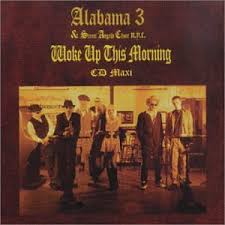
© Geffen Records
Alabama 3 – Newcastle, University of Northumbria, 2005
This was the best blues / country / techno / electronica / indie / trip-hop / acid-jazz gig I’ve seen, courtesy of the best (and possibly only) band in the world whose music ticks all those boxes, the Alabama 3. They’re not from Alabama, but from South London. Also, there’s eight or nine of them rather than three. With so many band-members onstage, and such a stew of different sounds, this gig at the University of Northumbria was inevitably a bit of a shambles – but what a glorious shambles. Their track Woke Up This Morning, which at the time served as the opening theme for The Sopranos (1999-2007), was particularly epic.
Primal Scream – Norwich UEA, 2009
I wasn’t expecting a great deal in 2009 when the Bobby Gillespie-fronted alternative rock band Primal Scream turned up at the University of East Anglia, where I was in the middle of doing a full-time MA. Feeling creaky and long in the tooth by then, I assumed my best gig-going days were behind me. I was too old for the mosh-pit, for jumping around and getting into the exuberant spirit of things. Meanwhile, I’d seen Primal Scream a few times before and found them a bit hit-and-miss.
But I ended up really, really enjoying myself. I managed to snag a position right at the edge of the stage, giving me a perfect view. And Gillespie and the gang were in blistering form. Primal Scream concerts can feel schizophrenic because their music veers between harsh, experimental electronica (like 2000’s Kill All Hippies) and loose-limbed, traditional Rolling Stones-style rock ‘n’ roll (like 1994’s Jailbird), but here it didn’t matter. They just alternated. They’d do one hardcore electronica number (accompanied by a brain-frying lightshow), followed by a Stonesy number, then another electronica one, then another Stonesy one, and so on. Somehow, tonight, it worked brilliantly.

From wikipedia.org / © Phil Guest

